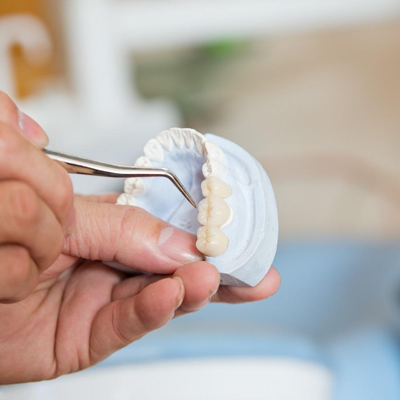Q&A With Dr Emma
Hi Dr .Emma, two years ago I had veneers placed on my two upper font teeth. Unfortunately the veneers didn't last more than 6 months. Do you think the answer would be to have crowns fitted on my two teeth, and if so would it be expensive? I look forward to your response. By the way I am over 80. Regards, David from Esperance.

Hi David,
I'm sorry to hear your experience with veneers didn't meet your expectations. There's a number of different reasons veneers can fail, all of them very individual, so I can't comment on what happened in your case without having seen you myself. There are a number of different things which can be considered "failure" as well:
- Debonding of veneers, (falling off, but intact).
- Fracture of veneers.
- Discolouration.
- Unfavourable gum response, (inflammation or recession).
- Poor aesthetics, which may be because of shape, size, colour, thickness, opacity.
A very common way for veneers to fail is fracture or debonding because of parafunction. That's a very jargonistic word which dentists like to use, it just means teeth are being used for something other than eating, smiling and speaking. Veneers will never be as strong as a complete, healthy natural tooth. When you add parafunction such as grinding in your sleep, or chewing on pens, veneers will be very susceptible to damage. It's part of a dentist's job to assess a patient's suitability for veneers, and patient with a significant grinding habit may not be a good candidate.
Crowns can be one way to tackle the problem of veneers which have failed for strength reasons. Crowns cover the entire visible part of the tooth, effectively wrapping it up like a helmet, so they tend to be stronger than veneers. There are down sides though. When compared with veneers:
- Crowns require more tooth to be shaved back, putting the tooth at risk of further problems down the track. Around 10% of all teeth which have crowns placed eventually end up needing root canal therapy.
- Crowns generally cost more than veneers.
- Although stronger, crowns can still break.
Another way to protect veneers is to have an occlusal splint made immediately after they are bonded in. An occlusal splint is a hard mouthguard which is worn while asleep, designed to protect teeth against the wear and tear of grinding.
If you're considering further treatment for your front teeth, your dentist will be able to advise you on the reason your veneers failed, and therefore what would be the best way to proceed. Try not to discount treatment options because of your age, which I assume you see as relevant or you would not have mentioned it. You don't want to get to 90 and wish you'd had treatment done at 80 which you could have had the benefit of for the past 10 years!
Thanks,